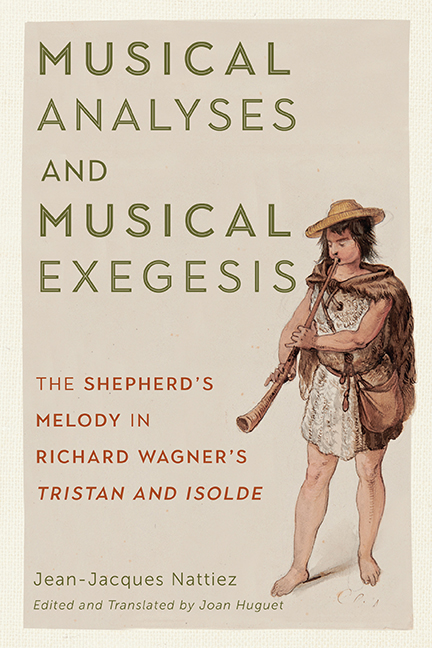 Musical Analyses and Musical Exegesis
Musical Analyses and Musical Exegesis Book contents
- Frontmatter
- Dedication
- Contents
- Foreword to the French Edition
- Preface
- Introduction: The English-Horn Solo, My Approach, and Models of Analysis and Musical Meaning
- Part I Immanent Analysis of the English-Horn Solo’s Musical Structures
- Part II Esthesic Analysis
- Part III Poietic Analysis
- Part IV Hermeneutics
- Conclusion: The Validity of Structural Analyses and Interpretations
- Bibliography
- Index
11 - “This Shepherd’s Metaphysical Melody”
Published online by Cambridge University Press: 02 June 2021
- Frontmatter
- Dedication
- Contents
- Foreword to the French Edition
- Preface
- Introduction: The English-Horn Solo, My Approach, and Models of Analysis and Musical Meaning
- Part I Immanent Analysis of the English-Horn Solo’s Musical Structures
- Part II Esthesic Analysis
- Part III Poietic Analysis
- Part IV Hermeneutics
- Conclusion: The Validity of Structural Analyses and Interpretations
- Bibliography
- Index
Summary
Up to this point, I have examined the shepherd's melody in the context of the opera as a whole from the perspectives of its listeners, Richard Wagner's poietic pathways, and psychoanalytic interpretation.
In his study of the English-horn solo, Christian Thorau discusses the following inscription from Wagner's Das braune Buch, in which the composer haphazardly jotted down ideas, sketches, and autobiographical notes. In his notes for November–December 1858, Wagner writes, “Very alone: dreamy. No work. Daru: Histoire de Ven.—Schopenhauer. Parsifal much in mind: shepherd's melody in F minor.” Wagner's invocation of Schopenhauer in such close proximity to the English-horn solo invites us to consider possible links between the philosopher's thoughts and the conception and composition of the shepherd's melody. This connection provides us with the means to further enlarge our field of hermeneutic investigation. Before doing so, let's review some relevant aspects of Schopenhauer's philosophy.
Arthur Schopenhauer's Conception of the Will
As the title of his most significant work The World as Will and Representation indicates, Schopenhauer's philosophy is based upon a duality. We cannot access the world directly, but instead must do so through the intermediary of its representation, which we create through our rational intelligence. It is thus by searching for causal relationships that we attempt to explain the objects of the world, which according to Emmanuel Kant are inscribed in time and space. However, this understanding of the world is not an understanding of its deepest essence, but only of individual objects. Our access to the world through representation, which is skewed by the principle of individuation, causes us to miss out on the profound unity in which its truth resides.
It might seem that, for Schopenhauer, we access the truth of the world by attempting to grasp the Ideas within ourselves and by moving beyond the immediately perceptible, a perspective that is both fundamentally idealist and Platonic in nature. Schopenhauer does not deny the existence of this phenomenon. However, the truth of the world situates itself further beyond this, in what Schopenhauer refers to as the Will.
There is something a bit troubling about the word “Will,” which implies an underlying conscious and voluntary intention. According to Schopenhauer, however, the Will exists as much in the mineral, animal, and plant kingdoms as it does in human beings.
- Type
- Chapter
- Information
- Musical Analyses and Musical ExegesisThe Shepherd's Melody in Richard Wagner's <I>Tristan and Isolde</I>, pp. 380 - 413Publisher: Boydell & BrewerPrint publication year: 2021
